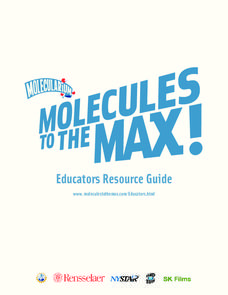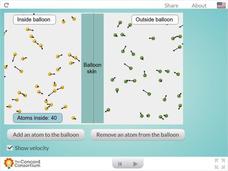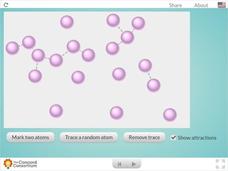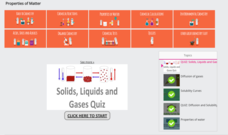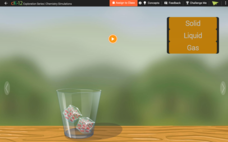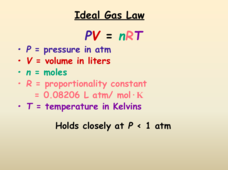Royal Society of Chemistry
A Cartesian Diver—Classic Chemistry Experiments
Sometimes the simplest experiments leave the biggest impression! Introduce young chemists to the Cartesian Diver by having them make one of their own. Use the Diver to further their study of liquids and gases, as well as compression.
Rensselaer Polytechnic Institute
Molecules to the Max!—Educators Resource Guide
From molecules to nanotubes, an engaging unit explores the world of tiny science. Fifteen hands-on experiments and lessons engage young scientists as they learn chemistry. Discussions, worksheets, and data analysis reinforce the concepts...
Concord Consortium
Gas Molecules in Motion
Get moving! Science scholars observe the effects of temperature on kinetic energy in an impactful interactive. Individuals control a sliding temperature switch and observe the motion of gas particles that results from the change.
Concord Consortium
What Is Pressure?
Balloons bring great fun to the classroom, until they break. What's a teacher to do then? Break out the balloon of the computer age with a fun interactive! Science scholars add and remove atoms from their virtual balloons and observe...
Concord Consortium
Intermolecular Attractions and States of Matter
Need a solid resource for teaching about states of matter? Science scholars go with the flow in a simple interactive that shows how intermolecular attractions determine a substance's phase. Pupils take control of the level of attraction...
Concord Consortium
Molecular View of a Gas
Welcome to the fast-paced life of a gas atom! Learners gaze at gaseous atoms up close using a colorful interactive. They can highlight two atoms and observe their movements within their container or follow the dizzying path of one atom...
Fuse School
Quiz: Diffusion and Solubility Curves
Quiz time! Part eight in a 14-part series about solids, liquids, and gases provides an opportunity to assess individual's learning. The interactive quiz covers the topics of solubility, solubility curves, and diffusion.
Fuse School
Quiz: Solids, Liquids and Gases
Time to show what they know! Module five in a 14-part series about solids, liquids, and gases redirects to an interactive quiz. Learners test their skills on topics such as states of matter, phase changes, and Brownian Motion. With...
Space Awareness
Water is a Heat Sink
One of the key objectives of Europe's Copernicus Earth program is to monitor the temperatures of the oceans and seas on Earth. Young scholars learn the effects of different heat capacities through two experiments. These experiments...
Columbus City Schools
What’s Up with Matter?
Take a "conservative" approach to planning your next unit on mass and matter! What better way to answer "But where did the gas go?" than with a lab designed to promote good report writing, research skills, and detailed observation....
Chymist
Pressure-Volume Relationships: Experiments with 140-mL Syringe
Learners examine Boyle's Law by analyzing experimental results with a hands-on lesson that provides a set of four experiments that illustrate the relationship between pressure and volume of gases. Groups analyze results using...
CK-12 Foundation
What's the Matter?
What makes ice, water, and steam different? Their molecular arrangements are the same, but their movements are different. Individuals make this conclusion by completing the simulation activity.
CK-12 Foundation
It's Just a Phase
Explore the phases of water as temperature rises. Pupils consider the idea that temperature remains constant during each phase change. An interactive exercise allows your young scientists to observe the temperature and molecular...
PHET
Gas Properties
We can't see most gases and we can't see things at the molecular level — but that's about to change! A simulation shows pupils the activity of molecules in a gas. The simulation allows scholars to vary the volume, heat, and...
US Geological Survey
The Water Cycle — A Placemat for Kids
What better time to reinforce a concept than when you're eating? Boost scholars' knowledge of the water cycle with an eye-catching placemat featuring playful raindrops and bright colors.
Science Geek
The Ideal Gas Law
When doing a gas lab, you might feel under pressure. A short presentation discusses the Ideal Gas Law. It begins with the units for each variable, then describes the behavior of real gases. The lesson concludes with a comparison of...
Center for Learning in Action
Water – Changing States (Part 2)
Here is part two of a two-part lesson in which scholars investigate the changing states of water—liquid, solid, and gas—and how energy from heat changes its molecules. With grand conversation, two demonstrations, and one hands-on...
Center for Learning in Action
Introducing Physical and Chemical Changes
Young scientists investigate chemical and physical changes to the states of matter—gas, liquid, and solid—as well as solutions and suspensions with a variety of demonstrations, grand conversation, and an interactive quiz to check for...
Center for Learning in Action
Water—Changing States (Part 1)
Here is part one of a two-part lesson in which scholars investigate the changing states of water—liquid, solid, and gas. With grand conversation and up to three demonstrations, learners make predictions about what they think will happen...
Center for Learning in Action
Challenge with Solids, Liquids, and Gases
There's a container for every matter—liquid, solid, and gas. Pupils design three different containers, each with the capability to hold one of the states of matter, and share their design with the class.
Center for Learning in Action
Introduction to the States of Matter
Liquids, gases, and solids are the states of matter in which scholars investigate in a lesson plan that offers in-depth information and engaging activities that look into the three states and the changes their properties make when mixed...
Center for Learning in Action
Density
Explore the concept of density within states of matter—gases, liquids, and solids—through a group experiment in which young scientists test objects' texture, color, weight, size, and ability to sink or float.
Center for Learning in Action
Gases
Explore the properties of gases through one activity and two investigations in which super scientists observe the changes gas makes when encountering different conditions.
Re Energy
Build Your Own Biogas Generator
What is biogas and how is it made? After examining background information about the sources of biogas and biogas generators, class members follow the provided information and build a biogas generator that can be used in the...



